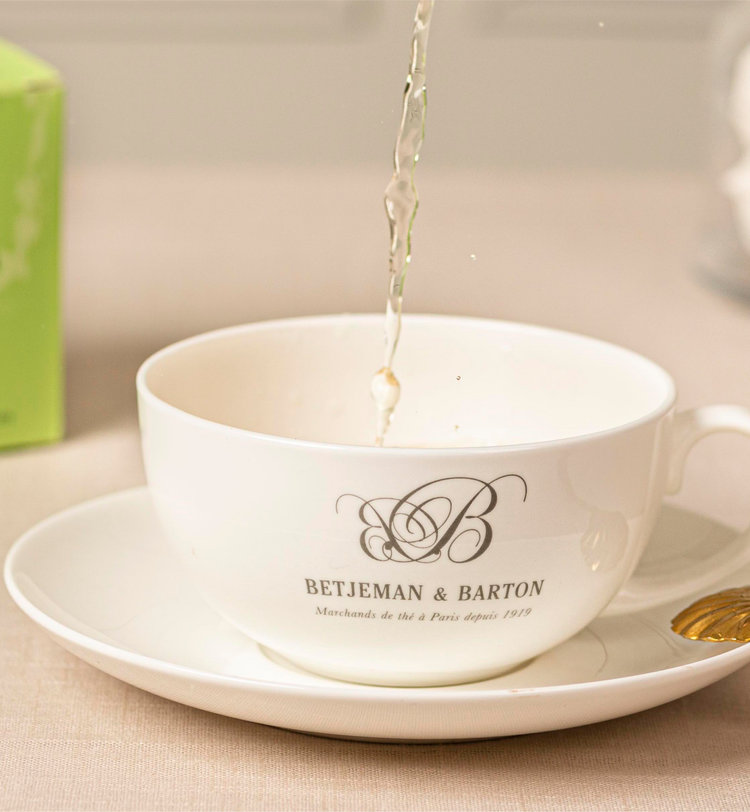Infusion, decoction, maceration: how to properly prepare your herbal tea?
At Betjeman & Barton, the art of herbal tea is a ritual of well-being. Infusion, decoction, or maceration: each method reveals the flavors and properties of the plants. Thanks to quality water, precise measurements, and a serene tasting experience, each cup becomes a moment of tranquility and relaxation.
The art of herbal tea is a deeply rooted tradition at Betjeman & Barton. A true daily wellness ritual, enjoying an infusion during the day or evening offers a moment of pause, comfort, and introspection, conducive to relaxation and self-reflection.
Besides the quality of the plants and ingredients selected, the preparation method also plays a vital role in highlighting the flavors and benefits of the beverage. Our company shares all its tips for preparing your herbal teas according to the rules of the art, whether by infusion, decoction, or maceration.
Infusion, the classic method for the tender parts of plants
Infusion remains the most common way to prepare herbal tea, whether loose leaf or bagged. Similar to tea, it involves pouring simmering water over the herbs and then letting them steep, covered, for a few minutes.
As gentle as it is quick, this technique is ideal for releasing the natural aromas and volatile compounds of delicate plants without altering their fragrance. When preparing herbal tea using this popular method, opt for filtered or soft water and a moderate brewing temperature, without boiling, to preserve the delicate notes of each ingredient in the blend. Generally, allow about 5 minutes of brewing time for a flavorful, caffeine-free hot beverage.
Infusions should be reserved for the most tender parts of plants, including the leaves. If bark or roots are infused, the active molecules may remain trapped within the plant tissues.
Thus, verbena, chamomile, linden, or peppermint are perfectly suited to this gentle method. This is also the case for the essential recipes in the Betjeman & Barton catalogue, such as the “ Shepherd’s Herbal Tea ” (linden, verbena, mint, orange blossom, and lemongrass) or the “ Summer Herbal Tea ” (verbena, peach, apple, rhubarb, and orange blossom).
Decoction, a deep extraction method for robust plants
Decoction is a traditional preparation method for herbal teas and regular tea. It is particularly renowned for its effectiveness in extracting the active substances from even the hardiest plants, starting with bark (cinnamon) and roots (ginger or licorice). Unlike traditional infusions, decoction involves simmering the plants directly in water. This allows for thorough extraction, resulting in more intensely flavored hot beverages.
Here are the steps to follow for successful preparation:
- Start the decoction cold. Place the plants in a saucepan and cover them with cold water.
- Next, bring the mixture to a boil, then reduce to a simmer. Let it simmer for 10 to 20 minutes, depending on the density of the plants chosen.
- Remove from heat and let stand for about 5 minutes before straining the drink.
- Use a fine filter, such as a strainer or tea ball, to obtain a clear decoction.
- Enjoy it hot or cold, as you wish!
Caution: Steeping for too long can degrade the active ingredients of the plants. Follow the recommended steeping times for cups that meet your expectations, balancing strength and finesse.
Maceration, a cold extraction method for sensitive plants
Also known as “cold infusion”, maceration combines gentleness and strength. Because macerating an herbal tea means soaking the plants in cold water for several hours, between 6 and 12 hours, to preserve the most fragile nutrients that are sensitive to heat.
For a quality infusion, prepare a carafe of fresh, filtered water. Add the recommended amount of herbs, then place the container in the refrigerator, making sure to cover it. Gently stir the mixture halfway through. Once the infusion time is complete, strain through a fine-mesh sieve. Serve chilled.
Whether in the middle of summer or throughout the year, maceration offers you the possibility of preparing refreshing iced herbal teas, to be consumed without moderation!
Our practical tips for successful preparation and tasting
Whether you opt for infusion, decoction or maceration, follow a few simple rules to prepare your caffeine-free drinks in the best conditions.
- Use quality water, i.e. filtered or low mineral content.
- Follow the recommended dosages per teapot or per cup.
- Opt for porcelain, stainless steel or glass, materials that preserve the natural flavors of plants.
- Depending on your preferences, add a personal touch to enhance each cup of herbal tea. Honey, lemon, a pinch of cinnamon: many ingredients can enhance the flavor of infusions.
- Take the time to appreciate your herbal tea: serve it in your favorite mug and enjoy it in a quiet place, for a perfect ritual.
Explore our extensive collection of infusions to find your new favorite herbal tea.

